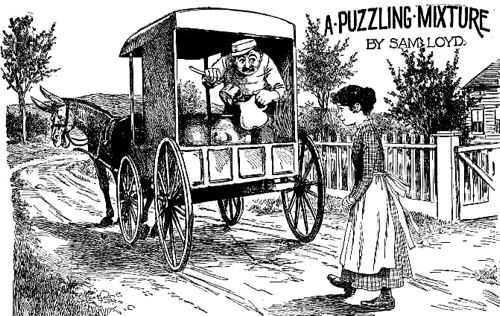



IS TOLD THAT AN honest and unsophisticated milkman, who had boasted much about his conscientious dealings and the fact of his never having disappointed a customer, found to his dismay one morning that his supply of milk was inadequate to the demands of his patrons. In fact, his stock was much too short to serve his route, and there was no possibility of getting any more milk.
Realizing the serious consequences which might result to his business, to say nothing about the disappointment and inconvenience to his customers, he was at his wits' end to know what to do in his dilemma.
After turning the matter carefully over in his mind he determined that as he was too conscientious and fair-minded to show partiality by serving some and passing others, he would have to divide what he had among them all, but would dilute his milk with a sufficient quantity of water to make it meet all demands.
Having found, after diligent search, a well of exceedingly pure water which he could conscientiously employ for the purpose, he pumped into one of the cans as many gallons of water as would enable him to serve all of his customers
Having been in the habit, however, of selling two qualities of milk. One for eight cents a quart and the other for ten, he proceeded to produce two mixtures, in the following ingenious manner, which is suggestive of a clever and interesting puzzle:
From Can No. 1, which contained only water, he poured sufficient to double the contents of Can No. 2, containing the milk. Then from No. 2 he poured back into No. 1 just as much of the mixture as he had left water in No. 1. Then, to secure the desired proportions, he proceed to pour back from No. 1 again just a sufficient quantity to double the contents of No. 2, which leaves an equal number of gallons in each of the cans, as may be readily shown, although there are three gallons more of water than milk in can No. 2.
Now, this is not as complicated a transaction as it looks, for it requires but three changes to equalize the contents of the two cans, but assuming that pure milk cost him two cents a quart, I wish to know how much money he received altogether if he sold out the entire stock at ten cents and eight cents a quart?
It is a pretty problem from the ordinary affairs of life well worth knowing, as it gives an idea of the profits of the milk trust, and explains the Farmers' Union formula for producing standard milk.
That honest milkman had five gallons of milk in can No. 2 and eleven gallons of pure water in can No. 1. Therefore, from can No. 1 pour five gallons of water into No. 2. Then pour six of that mixture back into No. 1, and then pour from No. 1 into No. 2 and there are eight gallons in each can, although in No. 2 there are three gallons of milk, and in No. 1 but two.
By selling from can No. 1 at 10 cents a quart he really gets 40 cents a quart for all the milk it contains, while for the other, which he sells at 5 cents a quart, he gets but 13 1/3 cents a quart, so he really gets three times as much for the milk from can No. 1 as for that from No. 2, which, therefore, is the correct answer to the puzzle.
2. A Legal Problem.
A correspondent who wishes to lay claim to an estate in chancery asks if there is a law in any of our states which would have prohibited his grandfather from marrying the sister of his widow. He says that the entire proof of his right of inheritance to an old farm now covered with sky-scrapers and palatial residences turns upon the solution of this question.
The problem has gone the rounds of the puzzle world as a clever catch which turns upon the point that a man must, be dead to make his wife a widow, so he could not marry his widow’s sister. Nevertheless, there is a good catch within the catch question which fairly reverses the popular answer. From a legal, as well as a practical, standpoint we would inform our correspondent that there was neither law nor objection to his grandfather having married the sister of his widow. Suppose A and B are sisters. The man in question marries A; she dies, leaving him a widower. He then marries B, who survives him and becomes his widow. Thus he may be said to have married his widow's sister (A), though she was his first, instead of his second wife. The grandson is therefore legally entitled to the old farm with its crop of sky-scrapers.
[Page 74]